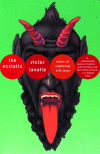 I’m trying not to go anywhere, drink too much, or read any books until I get past that deadline later this month, but a copy of Victor LaValle’s The Ecstatic just arrived, and I made the mistake of opening it.
I’m trying not to go anywhere, drink too much, or read any books until I get past that deadline later this month, but a copy of Victor LaValle’s The Ecstatic just arrived, and I made the mistake of opening it.
It’s hard to put down a novel that starts like this:
They drove a green rented car into central New York State to find me living wild in my apartment. Wearing shattered glasses and my hair a giant cauliflower-shaped afro on my head. I was three hundred and fifteen pounds. I was a mess, but the house was clean. They knocked and when I opened the front door there were three archangels on my stoop. My sister rubbed my ear when I cried. She whispered, — Why don’t you go put on clothes?
My family took me home to Queens and kept me in the basement. When I tried to go outside alone, they discouraged it. My sister led me by the hand when walking to the supermarket. Mom cut my meat at the dinner table. They treated me like what some still refer to as a Mongoloid. A few days of this is tenderness, but two weeks seems more like punishment. The spirit of blame stooped in a corner.
Their concern was wonderful, but the condescension was deadly. And surprising. Before opening the front door to them I really thought my life was full of pepper.
Three weeks after coming back to Rosedale I cooked a big, red breakfast for my family just to prove that I could. Not only to them, but to myself. It was September 25, 1995. I remember certain dates to organize and understand my disaster. Without them my mind is a mass grave.
It was a red breakfast because I added ketchup to the eggs when scrambling them. And to the bacon as it curled in the pan. Call me tasteless, but ketchup is the only seasoning I need.
I was so nervous that I even dressed up that morning. This bright purple suit that was loose on me and hid my tits. Made me look like a two-hundred-fifty-pound man.
Our oven was so hot I had to watch I didn’t sweat into the food. Wiped my forehead with my tie. I pulled butter from the fridge to set next to a plate of toast and if this didn’t make them happy then I was out of ideas.
But they didn’t appear. I waited a long time….
They’d hid in the bathroom. Mom leaned against the sink while Grandma rested on the toilet and my sister, Nabisase, sat on the rim of the tub. Three versions of the same woman — past, present and future — huddled in one room. With the door partway shut I was unseen and apart from them.
Mom whispered, –We should go to him.
— Yes. Grandma agreed, but they stayed there.
My family was afraid of me.
I expected more sympathy, actually, because I wasn’t the first one in my bloodline to go zipper-lidded. You should’ve seen when my mother tobogganed naked through Flushing Meadow Park in 1983. Four police carried her to the hospital wrapped in their jackets. Parents on the hill thought Mom was a hump-starved fiend out to abduct their children. Her illness often made her frenzied sexually. Whenever she relapsed the woman was an open womb, but Haldol had stabilized Mom’s mind for years.
There was my Uncle Isaac, too, who walked from New York to the Canadian border in 1986, and emptied out his brain pan with a rifle. So when they discovered me in that Ithaca apartment Mom and Grandma recognized the situation. Their boy had become a narwhal.
At the end of his novel, LaValle offers this explanation of the title:
An ecstatic is a term once used in places as diverse as seventeenth-century London and nineteenth-century Bengal to describe people whose actions were impossible to understand. The average person saw a man or woman who suddenly spoke gibberish or refused to bathe; a person they knew became a stranger. Seemingly overnight. Some saw these transformed people as possessed, or touched by God. Calling them ecstatics was a way to explain the unexplainable. Now, it seems likely that many of the ecstatics were mentally ill. I learned this curious history long before I finished my novel, but in the way it intertwined religious faith, the human need to know the unknowable, and mentall illness, it fit….
Unfortunately — or, because of the deadline, fortunately — I’m going to have to put The Ecstatic to the side for a while, because I think there’s a little too much overlap with the concerns of my own book.
I should mention that LaValle is a friend of a friend, and someone to whom I once spent an hour evangelizing about The End of the Affair, but it was only recently, when I happened across his comments on Kenzaburo Oe’s 1958 novella “Prize Stock,” collected in Teach Us to Outgrow Our Madness, that I realized I had to read his fiction